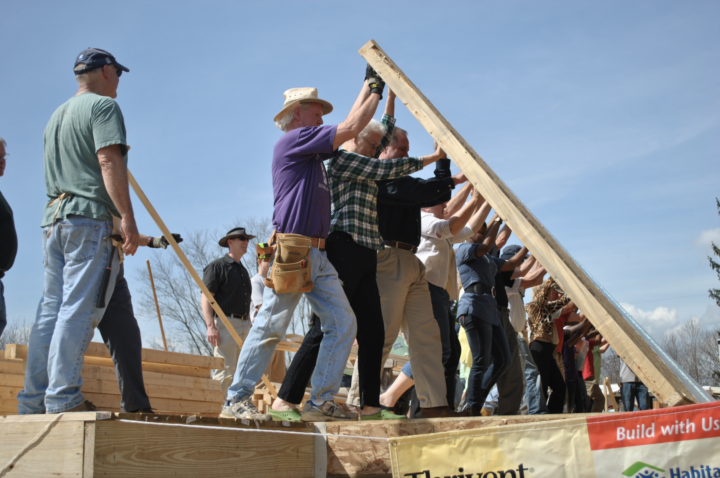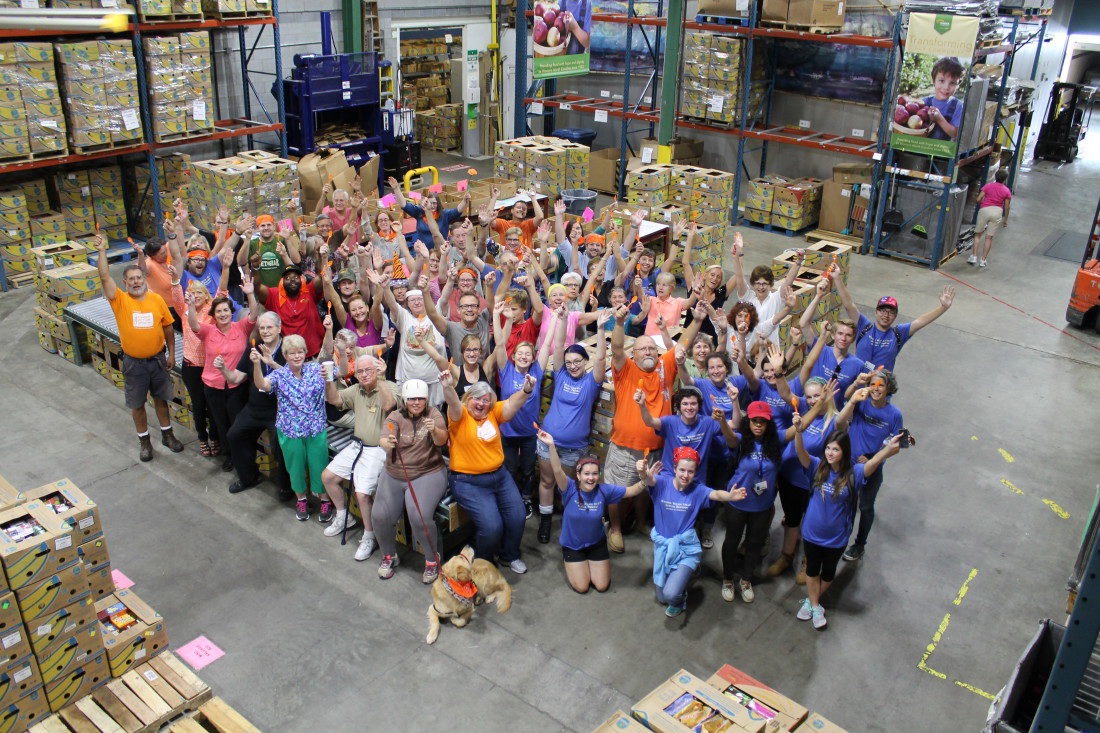MANNA FoodBank distributed 42,000 pounds of food to the hungry in 1983. Not bad for a new group operating out of the basement of Eliada Home and relying on a small group of volunteers driving their own cars.
That same year, Asheville Area Habitat for Humanity began building its first home, which would not be completed and sold until 1985 as volunteers worked just a few days a week over 18 months. And a group called Quality Forward celebrated its 10th anniversary by continuing efforts to clean up and beautify Buncombe County and promote environmental education in area schools.
Four decades later, the three nonprofits are still around, but their scope and missions have evolved considerably. MANNA, for instance, now distributes more than 42,000 pounds a day in 16 Western North Carolina counties. It operates out of a 50,000-square-foot double warehouse on Swannanoa River Road and has a fleet of 14 refrigerated trucks and a refrigerated van.
Habitat for Humanity builds 15-17 new houses and repairs 70-75 houses every year in Buncombe and Madison counties. And Quality Forward — renamed Asheville GreenWorks in 2007 — operates 250 environmental projects a year in areas ranging from urban forestry to water quality.
As MANNA and Habitat mark their 40th anniversaries and GreenWorks celebrates 50 years, Xpress sits down with long-time leaders from each group to discuss their longevity, how they’ve evolved over time and what the future holds.
People power
GreenWorks was never supposed to last 50 years. In fact, the organization was born with a three-year expiration date.
Its surprising longevity is thanks to more than 72,000 volunteers who have cleaned streams, picked up roadside trash and planted trees over the years, says Eric Bradford, director of operations. “When someone sees the vest that says ‘Volunteer GreenWorks’ on it, you know something good is about to happen.”
The group began in April 1973, when the city of Asheville and Buncombe County announced the formation of Quality ’76, an ambitious program designed to “improve the area” in anticipation of the nation’s bicentennial celebration in 1976. Much of the focus was on beautifying Asheville’s central business district and other parts of the county.
Quality ’76’s biggest project over its first three years was a deep cleanup of the then-polluted Swannanoa River.
“Well, 1976 comes, and there’s still so much work to do, and the community wouldn’t let it go,” Bradford explains.
The newly rechristened Quality Forward developed stewardship programs for the French Broad River watershed and the city’s urban tree canopy, worked with neighborhood groups and joined with the National Arbor Day Foundation to designate Asheville as “Tree City USA.”

In 2007, Quality Forward became Asheville GreenWorks to better reflect its environmental mission.
Bradford has worked for the group for 13 years, but his connection goes much deeper. As a child attending Buncombe County schools in the 1980s and ’90s, he heard Quality Forward’s message many times.
“They came into the schools and told us about environmental concepts,” he says. “They did this for years. They gave us ownership of the environment. So, I have a different view on it than most of my other colleagues because most of them moved in from outside of the area.”
Over the years, environmental educators from the group have spoken to more than 10,000 students, making the group’s message tangible to multiple generations, he says.
Habitat and MANNA leaders agree that community involvement has been key to their longevity.
“Habitat’s mission really resonates with people,” says Ariane Kjellquist, communication director. “Everyone can relate to housing because it’s a basic human need, and our work is really tangible. You can meet the homeowners, you can see the houses being built.”
Habitat builds and repairs homes Monday through Friday each week, with 25-30 volunteers participating each day for a total of about 55,000 volunteer hours annually, she says. The organization sells the new homes to qualified families at no profit. Homeowners are required to perform a minimum of 200 hours of sweat equity.
“A safe, stable, affordable home can change the trajectory of a family’s life, and we have seen that play out time and time again,” says Kjellquist, who’s been with Habitat for 17 years. “Children go to college, chronic health conditions dissipate, parents save for the future, families build generational wealth. Everyone is thriving instead of just surviving.”
The group became the first Habitat chapter in North Carolina when it was incorporated in February 1983. That October, volunteers constructed an extra bedroom onto a house on Highland Street. Since that first modest project, Habitat has built more than 367 new houses and repaired more than 400 existing homes. About 2,100 people in all have benefitted from those efforts, she says.
In the same time frame, MANNA has distributed more than 300 million pounds of food across Western North Carolina through 276 agencies. From three volunteers working out of that Eliada Home basement in 1983, the group has grown to rely on 3,000 or so every year.
“Since our infancy stages, it’s been all about the people who have come alongside us to help get food to those who need it most,” says Mary Nesbitt, chief development officer for the nonprofit for the past eight years. “It’s this vast community of incredible people who believe that no one should go hungry.”
Changing with the times
In addition to experiencing enormous growth over the decades, each of the nonprofits has seen its mission evolve in various ways.
“We’ve been really strategic about our growth and done so with intentionality and planning,” Habitat’s Kjellquist says.
In 1990, for instance, the group — then named WNC Habitat for Humanity — opened a furniture resale shop called the Habitat Home Store on Biltmore Avenue. In 2003, the Home Store moved to its current location on Meadow Road. In 2011, Habitat added 13,000 square feet to the spot and renamed it ReStore. A second location opened in Weaverville in 2019.
Proceeds from the ReStores help fund Habitat.
In 2009, the group became one of the first Habitat affiliates to do home repairs, such as replacing roofs and upgrading heating systems, in addition to building houses. More recently, it launched Aging in Place, a program that builds affordable one-story townhomes for people 55 and older.
“We know the population of older people in this community is growing at all levels, but nobody was addressing the low-income residents,” she says.
MANNA has grown in similar ways.

The group’s 1-800 Food Helpline allows people to call and find food pantries or programs in their areas. Additionally, Helpline operators are trained to help people sign up for the Supplemental Nutrition Assistance Program and connect them with other resources. In 2022, the helpline took 24,000 calls, Nesbitt says.
In 2018, MANNA received a $170,000 gift from the Glass Foundation to fund a food pantry on wheels to serve communities that lack their own pantries. The organization now hosts regular mobile markets in the 16 counties in partnership with community groups, public-sector partners and local nonprofits.
One of the biggest changes, Nesbitt says, is MANNA’s strategic decision about a decade ago to focus on healthy, balanced meals.
“Those in poverty, especially people of color and marginalized communities, face disproportionate health disparities,” she says. “We decided it was not enough for us to just get food to people. We have worked diligently on increasing the amount of fresh produce and protein and perishable items that we get to people.”
GreenWorks’ Bradford says the nonprofit has listened to the community when assessing how to evolve and change.
The group helped launch a pioneering recycling plan in Buncombe County in the early 1980s. Eventually, the city of Asheville and Buncombe County took over management of recycling and waste reduction, allowing GreenWorks to focus on core missions like urban forestry and litter cleanup.
More recently, the organization implemented a paid internship program for high school and college students who are Black, Indigenous and People of Color.
“I’m a cisgender white guy, and most of the environmental people look like me,” he says. “How do we change that? How do we say you’re welcome at the table? It’s a small program, but it’s a way we are trying to make inroads.”
Along the same lines, GreenWorks now looks at its projects through a lens of equity and inclusion.
“Being around for 50 years, we’ve been guilty sometimes of making decisions because we thought we knew better, like where to plant trees in a certain area,” he explains. “But nowadays you need to make sure that you’re receiving a lot of feedback from your community members before you make any decisions about the environments in their areas.”
Looking ahead
Each of the nonprofits has ambitious plans for the future.
GreenWorks’ strategic plan calls for addressing local climate issues, such as flooding and heat vulnerability, over the next five years, Bradford says. Additionally, the group wants to work with state and local governments, as well as private companies, on solving environmental problems like polluted local streams and rivers.
“We need to go upstream, not just in a physical but a figurative sense, and do what we can as a society to reduce that flow of this trash,” he says. “We’ve spent 50 years holding cleanups, so we know where it’s coming from. And now it’s time to start working with policymakers to say we have this data and it’s time to make a move because we can’t spend another 50 years just cleaning up the trash.”
Habitat’s strategic plan, which began in 2018 and runs through 2028, calls for the nonprofit to serve 1,000 families, which would address 10% of the region’s affordable homeownership and repair needs. “Affordable housing remains one of our region’s most pressing needs,” Kjellquist says.
Among the group’s other goals are identifying additional ways to invest in historically Black and Latinx communities and increasing its donor and volunteer base in Madison County. Habitat expanded operations to Madison County in 2021.
MANNA’s plans for the next decade include working with policymakers to help address the root causes of poverty and food insecurity.
“Our focus is always going to be food for today, getting food to people who need it,” Nesbitt says. “But we also want to expand our work in food for tomorrow and food for a lifetime. And the food-for-a-lifetime work is really around advocacy and public policy and public-private partnerships.”
The number of local nonprofits has grown considerably since 1983, but all three groups say things are more collaborative than competitive. For instance, Habitat and MANNA have teamed up on food drives in the ReStore, and GreenWorks has received funding through the store’s Register Round Up Program, which allows shoppers to round their purchases up to the nearest dollar in support of a local nonprofit they choose. And Bradford previously sat on Habitat’s Societal Impact Committee.
“Organizations tend to really have each other’s backs,” Nesbitt says. “I think that’s something that is really special about this area.”



Before you comment
The comments section is here to provide a platform for civil dialogue on the issues we face together as a local community. Xpress is committed to offering this platform for all voices, but when the tone of the discussion gets nasty or strays off topic, we believe many people choose not to participate. Xpress editors are determined to moderate comments to ensure a constructive interchange is maintained. All comments judged not to be in keeping with the spirit of civil discourse will be removed and repeat violators will be banned. See here for our terms of service. Thank you for being part of this effort to promote respectful discussion.